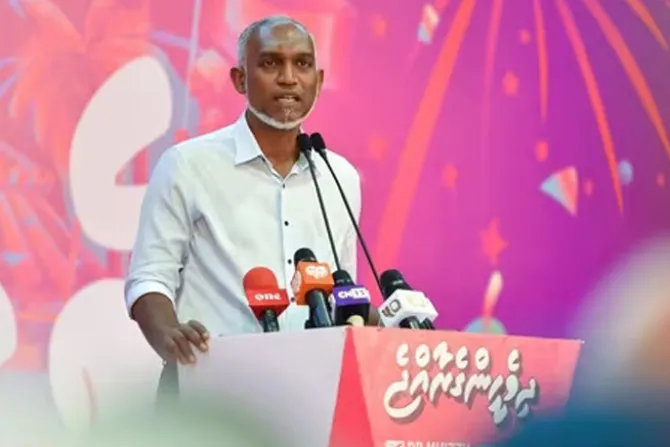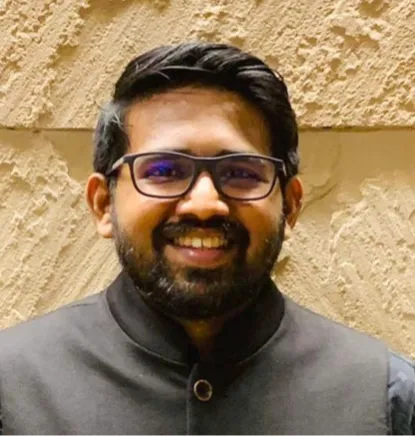-
CENTRES
Progammes & Centres
Location
The victory of a pro-China government in the Maldives offers Beijing an opportunity to restore its influence in the Indian Ocean region

Presidential elections in the Maldives have been rather traditional — each election offering a new chance to a new president. The fourth presidential elections in the Maldives were no different, with Mohamed Muizzu of the Progressive Alliance, a coalition of the Progressive Party of Maldives (PPM) and the People’s National Congress (PNC), defeating the incumbent, Mohammed Ibrahim Solih of the Maldivian Democratic Party (MDP). Muizzu’s victory has triggered curiosity about what it means for the country’s foreign policy and the Indian Ocean region. His win could be a window of opening that China desired. However, the newly elected president will have to walk a diplomatic tightrope between his domestic compulsions and the systemic competition between India and China.
The Progressive Alliance has preferred a closer relationship with China, due to its nationalist ideology, the leadership’s differences with India, and less tolerance for corruption and democratic norms.
This anxiety concerning the Indian Ocean emanates from the increasing partisan nature of Maldives’ foreign policy. The MDP looks up to India as a traditional partner and democratic power that is geographically close to the island nation and is a natural partner when it comes to assisting the country in security, defence, economy, and development. On the other hand, the Progressive Alliance has preferred a closer relationship with China, due to its nationalist ideology, the leadership’s differences with India, and less tolerance for corruption and democratic norms. Under President Abdullah Yameen (2013-2018), the Maldives had grown closer to China. It joined the Belt and Road Initiative (BRI), borrowed extensively, leased islands, signed a Free Trade Agreement ( FTA), and discussed establishing a Joint Ocean Observation Centre with China. In the months leading to the 2018 elections, Yameen also accused New Delhi of interfering in domestic affairs and asked Delhi to take back the helicopters it had gifted to Male. Yameen’s successor, Ibrahim Solih of the MDP, made efforts to normalise relations with India. His “India First” policy increased the country’s development and defence partnership with New Delhi, and Chinese projects harmful to Indian interests were averted. In terms of development, India has offered more than 50 community development projects and even initiated the Greater Male Connectivity Project. On defence, India is building a naval harbour at UthuruThila Falhu, conducting hydrographic surveys, and has offered a Dornier aircraft.
India has offered more than 50 community development projects and even initiated the Greater Male Connectivity Project.
The Progressive Alliance has, however, criticised this policy with its “India Out” campaign. Through rallies, disinformation, and protests, the campaign has politicised India’s defence and development assistance, mustered nationalist sentiments, and accused India and the MDP government of violating the country’s sovereignty. This campaign helped Muizzu win the presidential elections. In his first speech after winning the elections, Muizzu asserted that he would maintain a “pro-Maldives” policy and criticised the government for extensively borrowing from India. He also reiterated that he would review agreements with India and remove all foreign (read Indian) soldiers from the Maldives through diplomatic channels. In his first meeting with the Indian high commissioner, Muizzu again highlighted concerns of sovereignty, economic partnership, and debt restructuring. Given the domestic compulsions of Yameen’s stronghold over the party and the need to satisfy his constituency, Muizzu might likely walk his tough talk. On the other hand, the victory of a pro-China government offers Beijing a fresh window of opportunity. The Maldives is at the heart of the Indian Ocean and the evolving Indo-Pacific world order. The country is surrounded by crucial sea lines of communication, and strategically located between India and Diego Garcia–making it a preferred destination for operating a military base and maritime surveillance. With such strategic stakes, China has been visibly upset in the past five years, with India and the United States making inroads in the country. Beijing is likely to use this opportunity to restore its influence in the Maldives and the Indian Ocean region. With Muizzu in power, Beijing might re-commence its support to major infrastructure projects, restart the FTA, and expand diplomatic and political engagements.
With such strategic stakes, China has been visibly upset in the past five years, with India and the United States making inroads in the country.
This does not mean India has lost the plot. Prime Minister Narendra Modi was the first leader to congratulate Muizzu on his victory–indicating India’s willingness to work with the new administration. Similarly, the senior leadership of the Progressive Alliance has admitted that India is likely to be Muizzu’s first destination for a foreign visit, and a preferred partner. Despite domestic posturing, there is a hard realisation in the Maldives that India is the biggest security partner in the region and makes up for Male’s scarce maritime surveillance capacity and capabilities. It is no coincidence that even Yameen continued defence cooperation with India during the roughest phase of bilateral relations. Besides, India is also the Maldives’ biggest trade partner, a top export destination, and a traditional donor. Further, the Sri Lankan crisis might also caution the incoming government on relying too much on China for debt restructuring and financial assistance. In fact, as Male’s debt servicing to India coincides with depleting foreign reserves, it will try to keep India on good terms.
India is also the Maldives’ biggest trade partner, a top export destination, and a traditional donor.
There is no denying that given the ideological and domestic compulsions, Muizzu might be tempted to embrace China. But he will also not hesitate to leverage the geopolitical jostling to exercise more agency and further the country’s interests. The competition between India and China is not limited to one election or one party. Both countries will try to compete and outdo each other in the region. On its part, India is growing accustomed to its smaller neighbours’ increasing agency and tendency to play Beijing against Delhi. India too is likely to show pragmatism and flexibility with the administration as long as the incoming government respects its sensitivities and security concerns.
This commentary originally appeared in Hindustan times.
The views expressed above belong to the author(s). ORF research and analyses now available on Telegram! Click here to access our curated content — blogs, longforms and interviews.

Professor Harsh V. Pant is Vice President – Studies and Foreign Policy at Observer Research Foundation, New Delhi. He is a Professor of International Relations ...
Read More +
Aditya Gowdara Shivamurthy is an Associate Fellow with the Strategic Studies Programme’s Neighbourhood Studies Initiative. He focuses on strategic and security-related developments in the South Asian ...
Read More +